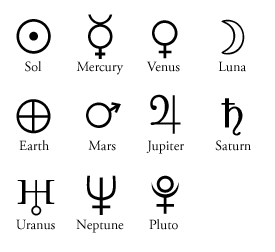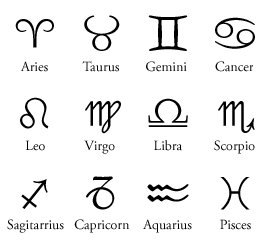Components of Astrology
(Difference between revisions)
Categories: Astrology | Astrological terms
|
Revision as of 23:59, 1 Aug 2005 Frater C.U.G. (Talk | contribs) spelling |
Revision as of 05:32, 23 Jun 2013 Capella (Talk | contribs) Planets |
||
| Line 9: | Line 9: | ||
| ===Planets=== | ===Planets=== | ||
| + | The Sun is the head of the '7 Governors of the Ancient Astrology' with the 3 outer planets (non-naked eye planets) considered 'higher octaves' of 3 of the governors. | ||
| + | Note: Modern astrology is more inclusive of the outer planets. | ||
| + | |||
| [[Image:Planetssigns.gif|right]] | [[Image:Planetssigns.gif|right]] | ||
| *'''[[Sun (astrology)|Sun]]'''—the inner core of a person or situation, the deepest self and influential power. | *'''[[Sun (astrology)|Sun]]'''—the inner core of a person or situation, the deepest self and influential power. | ||
Revision as of 05:32, 23 Jun 2013
 |
This article is incomplete. You can help Thelemapedia by adding to it (http://thelemapedia.org/index.php?title=Components_of_Astrology&action=edit). |
Unlike the daily horoscope in the newspaper, the many astrological components form a complex system. They fall under the general categories of heavenly bodies, the Zodiac, houses, aspects, motion, and interpretation.
A brief discussion on how the various astrological components work together...
| Table of contents |
Heavenly bodies
Planets
The Sun is the head of the '7 Governors of the Ancient Astrology' with the 3 outer planets (non-naked eye planets) considered 'higher octaves' of 3 of the governors. Note: Modern astrology is more inclusive of the outer planets.
- Sun—the inner core of a person or situation, the deepest self and influential power.
- Mercury—reason, intelligence; writing, orderliness, education, skill.
- Venus—beauty, allure, pleasure, relationships and eroticism.
- Luna—feelings and emotions; illusion; imagination.
- Mars—action, spontaneity, aggression, and drive.
- Jupiter—expansiveness and growth; justice, fortune.
- Saturn—discipline, responsibility, limitations, and resistance; law and order; caution and reserve.
- Uranus—technology, the future, science, innovation, radical change, the unexpected.
- Neptune—inspiration, spirituality, magick, enchantment, dreams, altered states.
- Pluto—power, metamorphosis, change and rebirth, cycles of dying and becoming.
Asteroids
Other bodies
Moons
The Zodiac
The Zodiac refers to the twelve constellations that fall on the plane of the ecliptic (the path the sun takes across the sky over the course of the year). The following is a general description of their characteristics:
- Aries—"I want," action oriented, pioneering, assertive, enthusiasm, competitive
- Taurus—"I have," sensual, cautious, stubborn, physical
- Gemini—"I think," curious, talkative, sociable, duality, mercurial, intelligent
- Cancer—"I feel," sensitive, tenacious, family and home oriented, helpful, nurturing, moody
- Leo— "I am," passionate, dramatic, independent, noble, leader, egotistical, selfish
- Virgo—"I serve," practical, analytical, work and service oriented, critical, common sense, orderly
- Libra—"We are," partnerships, balance, grace, charm, cooperative, social, ideas, lazy, kidneys/lumbar
- Scorpio—"I desire," intense, controlling, sexual, compulsive, deep, secretive, mysterious, obsessive
- Sagittarius—"I seek," philosophic, fun-loving, adventurous, blundering, wanderlust, scattered
- Capricorn—"I build," ambitious, cautious, authoritative, cunning, competent, stable, saturnine
- Aquarius—"I know," friendships, cause-oriented, the group, society, progressive, eccentric, aloof
- Pisces—"I believe," feeling, duality, spirituality, soul growth, suffering, artistic, overly emotional
Houses
Most astrological systems divide the astrological chart (or natal chart) into twelve houses, which depend more on the time and place of birth (or initiation) than on the date. To calculate the houses of a chart it is necessary to know the exact time of birth. If the time of birth is unknown some astrologers will assume a birth at noon or sunrise, but an meaningful interpretation of such a chart cannot be expected.
There are many ways to divide the ecliptic into twelve houses. The main House systems are: Placidus (the most common), Equal, Whole, Regiomontanus, Meridian, Campanus, Porphyry, Koch, Topocentric.
The houses are departments of life, described in terms of man's physical surroundings as well as personal life experiences, and have some correspondence with their natural sign, i.e. the first house has a natural affinity with the first sign, Aries, and so on. The following is a general description of their characteristics:
- First house: Identity, self-image, movement and expression, physical appearance, and the impact of the personality on the environment. This is the way you present yourself, and how you start things. Planets here may also indicate the manner of one's birth.
- Second house: Values, substance, money, possessions, security, stability, the here and now, sense of self-worth, emotional resources, rewards, comfort, inner talents and resources.
- Third house: awareness, mental expression, early schooling, siblings, attitudes, daily life, companions, all forms of communication and short journeys, adaptability to new ideas, ability to relate to one's surroundings and environment.
- Fourth house: Home, foundations, parents, domestic matters, heritage, roots, sources of nourishment.
- Fifth house: Anything added or taken away from the fourth house, children, romance and love affairs, ego, creative expression, play and gambling, attitude to change.
- Sixth house: Housework, employment and employees, attitude to work, general health, purification, ritual, habits, hobbies.
- Seventh house: All kinds of partnerships, marriage, awareness of others, how one relates to people.
- Eighth house: Joint or shared resources, sex, inheritance, sex and regeneration, emotional union.
- Ninth house: Travel, religion, search for meaning, higher education, goals and aspirations, seeking and finding.
- Tenth house: Public image, profession, persona, reputation, values and standards, ideals, how one would like to project oneself.
- Eleventh house: Friends, social values and concerns, groups and group awareness, hopes and dreams, attitude to humanity.
- Twelfth house: Hidden motives, confinement, retreat, self-transcendence, service and sacrifice, escapism, charity.
Aspects
The angular relationships between the planets as they actually exist in space are termed “aspects”. These aspects are believed to influence the nature of the planets and how they work together. The following is a general description of the major aspects:
- Conjunction (0°)—Harmonious
- Opposition (180°)—Disharmonious (not necessarily negative); also energizing
- Square (90°)—Disharmonious and blocked
- Trine (120°)—Harmonious & complementary
- Sextile (60°)—Moderately harmonious
More aspects...
Orbs
Motion
Retrograde
Transits
Returns
Processions
Equinoxes & Solstices
Interpretation
Natal charts
Other charts. Methods of interpretation.
![[Main Page]](http://www.thelemapedia.org/images/logo.gif)

